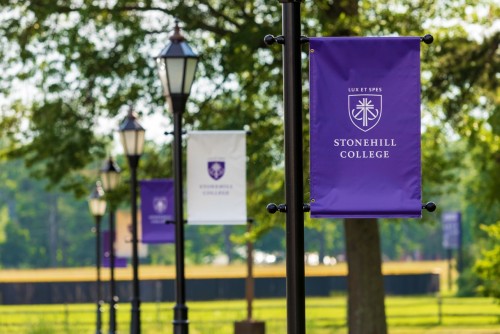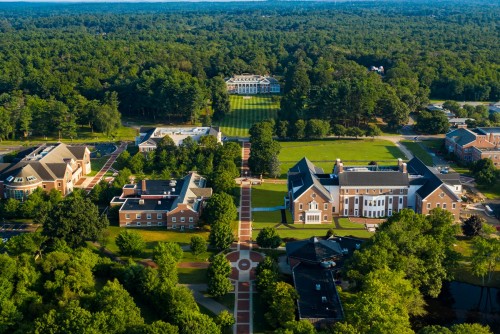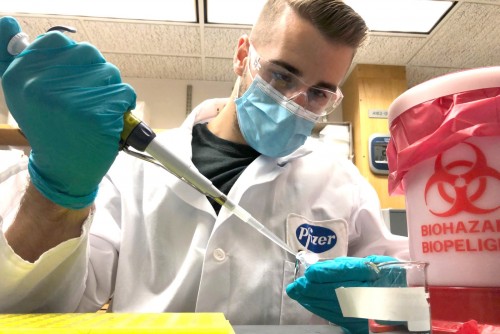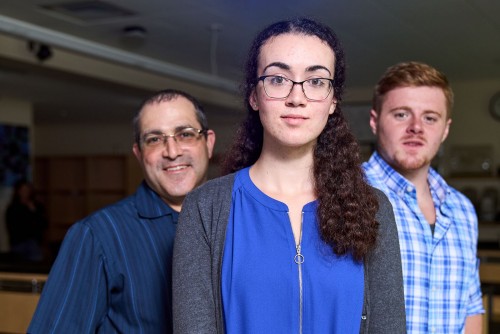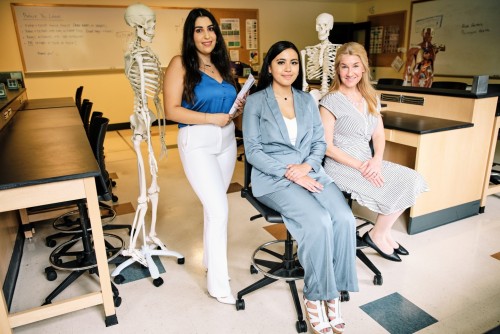Race, Autism and the Path To Compassionate Support
Two healthcare administration majors use Stonehill’s summer research program to address issues of accommodation and access in the nation’s health system.
Editor’s note: This story references Stonehill’s Healthcare Administration Program, which is now the Healthcare Management program. It is also one in a series of stories on work done by students who participated in the 2021 Stonehill Undergraduate Research Experience, which pairs students with an experienced faculty mentor to perform significant, publishable research.
While working on two disability-focused SURE projects this summer, Professor Danielle Waldron of the Healthcare Administration Department took a unique step to ensure Jacquelin Sauer ’23 and Megan Anderson ’22 could empathize with the population they were studying.
“Dr. Dani played sensory videos to help us understand the perspective of someone on the autism spectrum,” Sauer said, referring to videos that amplify the sensory challenges faced by those on the spectrum. “This helped me to step back and analyze situations before I judge.”
Waldron says such engagement is an example of what professors bring to SURE but is quick to point out that it also works the other way around.
“When we collaborate, I take off my professor hat and any student-professor power dynamics dissolve,” Waldron said. “I edit their work, they edit mine and together we get the job done. I could truly go on and on about Jacki’s and Megan’s energy, enthusiasm and ingenuity.”
Professor Danielle Waldron, left, Megan Anderson ’22, center, and Jacquelin Sauer ’23 gather outside the Meehan School of Business, home to Stonehill's Healthcare Administration Department.
Autism and the Power of Community and Exercise
Sauer, a healthcare administration and health science double major from Dedham, Massachusetts, worked with Waldron on research into the potential health benefits of community engagement and aerobic exercise/muscle strengthening for older adults with autism.
Community engagement programs have been shown to reduce comorbidities such as diabetes among adults on the autism spectrum. It is critical, however, that organizers take care to create environments that allow all participants to maximize the benefits — creating spaces that offer a respite for individuals experiencing sensory overload, as well as opportunities for fellowship that often help people with autism feel accepted. The SURE researchers saw the effects of such considerations firsthand as they met with individuals on the spectrum during Autism Acceptance Night at Polar Park, home to the Worcester Red Sox, a minor league baseball team competing at the Triple-A level. Working with fellow students Emily Hartford ’23, Abigail Ridge ’23, Caitlin Regan ’22 and Peyton Nickerson ’23, they also prepared resources to be used throughout the season to make Polar Park enjoyable for fans seeking sensory accommodations.
Those experiences and their related research led to the creation of a debriefing paper suggesting an increased community engagement for this population with plans to distribute the document to state disability services agencies across the nation.
Sauer said she believes the document, generated in partnership with Stonehill’s student-run graphics organization InHouse Design, is novel because it fills gaps in autism research.
“Older adults on the autism spectrum aren’t studied often,” she said. “Most of the information we have is about children, young adults and teenagers, but not adults 65 and older.”
As part of their SURE project, Jacquelin Sauer, Megan Anderson and Danielle Waldron, left to right above, met with individuals on the spectrum during Autism Acceptance Night at Polar Park, home to the Worcester Red Sox, a Triple-A minor league baseball team. Below are two signs that were among the resources they created to be used throughout the season to make Polar Park enjoyable for fans seeking sensory accommodations.
Race, Disability and Barriers to Needed Health Services
While Sauer led the group’s autism research, Anderson led the group’s other project, which analyzed disparities in health service utilization for adults with disabilities across races.
Research shows that a person’s race or disability status can determine the quality of the medical treatment they receive. Healthcare professionals are not always cognizant of their own bias, but these inherent prejudices correlate with a downward trend in healthcare utilization among nonwhite and disabled patients. The group concluded that it is imperative that people working in medicine receive training and education so that they not only learn to recognize their own bias but also make changes that will allow all people to receive high-quality treatment.
Using survey data, they examined the occurrence of these disparities in relation to the Affordable Care Act’s implementation.
Anderson, a healthcare administration major and business administration minor, said this work inspired her to serve as an ally to the disability community.
“In my free time, I’ve been talking to friends more about subjects like the Americans with Disabilities Act. SURE has gotten me interested in spreading awareness about these topics,” said the Wilbraham, Massachusetts, resident.
As was the case in the research led by Sauer, Anderson’s project also helped fill a gap in available research.
“Oftentimes, studies focusing on adults with disabilities include primarily non-Hispanic white respondents,” Waldron said. “Therefore, this research would break new ground in diversifying health services research on this population.”
Related
-
Request Information
Sign up now to be added to our mailing list, and we will show you how Stonehill could become part of your story.
-
Visit Opportunities
Our visit programs will help give you a better understanding of how Stonehill’s expansive leadership and experiential learning opportunities equip students for success in a rapidly evolving and globally competitive world.
-
Apply for Admission
Stonehill College provides an exceptional learning experience for both undergraduate and graduate students. We invite you to review the process, requirements and application deadlines for our entry options.
Additional Stories
-
Team Vaccine
In a poignant reflection of Stonehill’s mission, a number of students and alums are putting their degrees to work in the race for a COVID-19 vaccine.
-
The Politics of Heritage and Class
Two political science students used their summer research opportunity to study identity politics through the lens of ethnicity and socioeconomic status.
-
Understanding COVID-19’s Impact on Campuses
Two students and their professor help advance research into ways colleges can better protect campus communities during high-stress events such as a pandemic.
